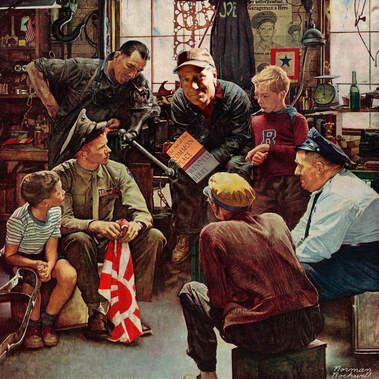 By David Barr It can be hard for many people to see why anyone would want to do away with capitalism. It can be especially hard to see why anyone would think capitalism is essentially about exploitation, greed, and materialism. This line of critique is just plainly implausible to many of us. When we think about why people we know and respect do their work, it doesn’t look like greed. People who start a business, for example, are after a lot more than money. They can realize their dreams, build families of loyal employees, and pass on their businesses to their children. Craftspeople produce goods and provide services that reflect who they are and what they care about. When markets work like this, people do not just make money; they pursue a vocation that is theirs, something in which they can take pride and find satisfaction.
3 Comments
 I have a friend who works with an organization that hosts conversations between conservatives and liberals. When he checks people into the meetings, he asks them to identify as a member of one group or the other, a “red” or a “blue.” He says a lot of folks object to the binary choice and launch into a description of their special, unicorn-made-from-snowflakes political beliefs. When they do, he politely informs them that this is what everyone says and politely asks them again to pick a team.  By David Barr With football coach Dabo Swinney in the news so much due to Clemson's victory in the national championship game earlier this month, I was reminded of the time he was asked his opinion of football players kneeling during the national anthem to protest racist police violence. As part of his answer, he blamed the problem of police shootings on the moral failures of individual cops. He said, “It’s so easy to say we have a race problem, but we got a sin problem.” Swinney is not alone in thinking this way. Christians, especially evangelicals, often explain problems like poverty, violence, and prejudice in terms of sin, rather than attributing these specific problems to specific causes that we might address. I regularly hear people say things like, “The problem isn’t X; it’s sin.”  by Russell Johnson People who work for political depolarization, as I do, get quizzical looks from people who focus primarily on other social issues. Republican-versus-Democrat, after all, is not as significant as gender, race, class, religion, worldview, or culture. More often than not, the dichotomy between "liberal" and "conservative" conceals more than it reveals. While I don’t want to make the Brett Kavanaugh drama about myself, this week’s events provide me with an opportunity to explain why I study and write about political polarization. When we hear about a new event, our first impression depends on which series of events we interpret it as being part of. One may go on to revise one’s interpretation as one accumulates more evidence, but often evidence serves to confirm the narrative one initially uses to make sense of the event. What you find plausible depends on how you initially categorize an event.  By Russell Johnson Political discourse is plagued by false either/ors. While there are sometimes mutually exclusive options (e.g., should we pass this law, or shouldn’t we?), people typically whittle complicated issues into simple dichotomies that distort more than they clarify. We often find ourselves in debates that aren’t about mutually exclusive options at all—Should we change abortion laws, or support would-be single mothers to make abortions less common? Should we protect free speech, or resist bigotry? Should we make sure everyone has access to good schools, or allow parents to choose where their children learn? I mean, why not both, right? That having been said, saying “Why not both?” always feels to me like a bit of a cop-out. To simply acknowledge that there are good points on both sides of a debate, or to insist that competing plans aren’t mutually exclusive, can be a lazy way of avoiding the difficult questions that give rise to the debate. “Why not both?” can be an excuse to stay on the sidelines, self-satisfied with one’s own enlightened detachment from any particular solution. I think “Why not both?” is important to remember, but not if it’s used to dismiss the need for commitment. It has a place in the conversation, but it can’t be the last word. One way to go beyond false dichotomies and beyond “why not both?” is to think in terms of the many factors that go into solving any complex problems. We have to think algebraically. 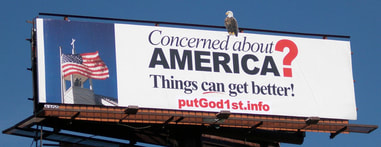 By David Barr Christians often credit or blame the changing fortunes of America on changes in our religious commitments. Some of these theories are nutty: I once heard a guy claim that Hurricane Katrina was punishment for a slackening of U.S. support for Israel at the time. Others aren't nutty, but still pretty strident: folks like Bill O’Reilly and Mike Huckabee have pointed to the end of prayer in schools as the cause of things like school shootings (okay, I take it back; that's still pretty nutty).* More subtly, many Christians point to evangelism as a way to address problems like crime and poverty or credit the Christian religion with successes in our nation’s past. People envision the connection between religion and the fate of the nation in different ways. Some, like the man with the Israel-Katrina theory, see God as directly intervening to bless or smite us in response to our policy decisions. Others see a more naturalistic cause and effect: Christianity makes us better people and a nation thrives when its people are more honest and hardworking, less violent, and so on. However they see it working, it is very common for American Christians to think our current problems are because we have abandoned Christianity. This is a really bad idea, and for a few reasons.  by David Barr Gun control supporters often struggle to understand the fierceness with which gun advocates oppose compromise on the issue. This struggle is understandable: if you think of guns as useful only for hunting or perhaps home defense – with the tradeoff being thousands of avoidable deaths – it is hard to see why anyone would stridently oppose all forms of gun control. It is thus important for gun control advocates to see the extent to which many gun advocates see the right to bear arms as a foundational right – perhaps even the foundational right – on which all the others depend. They will only understand that position if they see the way its roots reach into the myths of the American struggle for independence. It is likewise important for gun rights advocates to see how this belief rests on bad myths about the revolution. 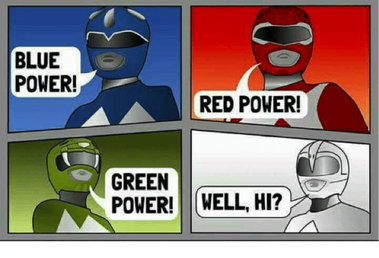 By David Barr White people often get defensive in conversations about race because it can feel to us like being white is always a bad thing. We have to be apologetic: whiteness is something to be ashamed of, not to celebrate. This can seem unfair. Because of this, you often hear people say things like, “If black people can have their own parades/awards shows/advocacy groups/TV networks/whatever else, why can’t we?”  by Russell Johnson Gun control is one of the most frequently talked about political issues in America, but these interactions rarely seem to change people’s minds. This might be true even of the most thoughtful, reasonable discussions, but the gun debate has been characterized by bad arguments that we should never expect to change anyone’s mind. This is often because representatives of one perspective caricature and misunderstand the logic behind other perspectives, so we end up arguing against positions that few people, if any, really hold. The more we rely on these shallow arguments, the more we insulate ourselves in bubbles, making it harder for us to understand one another and harder to seek the truth. In this post, I’ll survey nine all-too-common arguments, from "both sides," that we can safely retire.  Today marks the fiftieth anniversary of the My Lai Massacre. It's worth taking a moment today to reflect on this event, what it tells us about war and what it tells us about ourselves. Here's a blog post Russell wrote for the Political Theology Network reflecting on My Lai and how the dangers of dehumanization extend even into our everyday political discourse.  By David Barr When I was young, I became quite enamored with something called ‘apologetics,’ the art of defending the Christian faith against intellectual attack. At the time, it felt like learning Christian nerd karate. My friends and I would read up on things like the ontological argument for God and exchange CDs of debates between apologists and atheists like they were underground mixtapes or bootleg DVDs. Now, I don’t want to come across as dismissive of the very laudable attempt to articulate the Christian faith in an intellectually clear way. It is great for young Christians to learn to think for themselves and to learn how other people think differently. I think this phase was good for me, at least in the long run. Simplifications help young minds learn to think; the danger is when they persist in mature minds.  by Evan Kuehn One of the virtues central to the decade in American public life between Barack Obama’s The Audacity of Hope and the end of his presidency is that of empathy. In a commencement speech to Northwestern University given just before he announced his candidacy for president, Obama famously spoke of an “empathy deficit,” and emphasized the importance of “the ability to put ourselves in someone else’s shoes; to see the world through those who are different from us.” He would carry this theme consistently through his administration, mentioning empathy as an important criterion for a Supreme Court nominee, and in 2016 reiterating its value in a commencement speech to Howard University: “we must expand our moral imaginations to understand and empathize with all people who are struggling.” 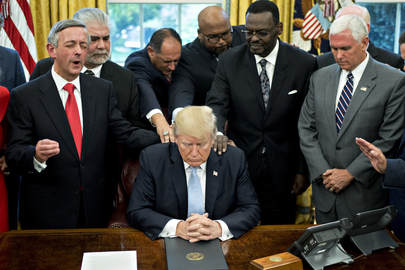 David's essay "Evangelical Support for Trump as a Moral Project: Description and Critique" is the featured article in the January issue of the Religion and Culture forum. The article can be found here. From the abstract: "The rise of Donald J. Trump to the presidency has caused a crisis of misunderstanding in American politics. From the perspective of his critics, his ethos, rhetoric, and politics are so self-evidently evil, they cannot imagine how anyone could support him from anything other than depravity or ignorance. This essay makes the case that there is a deeper meaning beyond this apparently obvious one, and realistic political analysis requires that we recognize it. Barr argues that many American evangelical Christians support President Trump as an expression of a positive moral vision for American government and society. Drawing on the work of political scientist Benjamin Lynerd, Barr shows the deep roots of the affinity for Trumpism found in the political theology of American evangelicalism. Those affinities explained, it concludes with a turn to the thought of Reinhold Niebuhr and current research in the sociology of religion to show the errors and perils that result in and from it." The Religion & Culture Forum is a digital publication of the Martin Marty Center for the Advanced Study of Religion at the University of Chicago Divinity School. It hosts conversations about the relationship between scholarly work on religion and global public cultures.  By Russell Johnson for Martin Luther King Day, 2018 Even as an elementary school student, I knew Martin Luther King Jr. took a stand for integration. But what “integration” meant for King is something I’ve only recently begun to understand. Integration must first be distinguished from inversion. King was not interested in merely transferring power from whites to blacks while keeping the exploitative power structure unchanged. An unjust society cannot be integrated, regardless of the color of those in charge.  Last year, Fifth Harmony topped the charts with “Work from Home,” a song with the chorus “work work work work work work work [indecipherable] work work work work work work work.” This is not to be confused with Rihanna’s single “Work,” whose chorus goes “work work work work work work, [indecipherable] work work work work work work.” Similarly, the difference between Democrats and Republicans is relatively minor when it comes to the issue of work. Both sides agree that people should work, and that they should be remunerated for their labor. In this post, we’ll talk about one difference: different caricatures that feature prominently in the political imaginations of the two parties.  “Don’t blame the gun lobby, blame the gun man,” “liberals blame Republicans, the NRA, and White Supremacy,” “don’t blame mental illness,” “media, you are to blame,” “blame gun violence on a sick world,” “don’t blame the Second Amendment,” “gun control blame game,” “professor suggests Trump deserves blame,” “Conway blames Obama for failing to regulate,” and the list goes on... In the wake of mass shootings, language of “blame” can be found everywhere. Pundits, bloggers, and politicians, whatever their disagreements, all rush to answer the same question: Who’s to blame for this? Is toxic masculinity to blame? Lax gun laws? Poorly enforced laws? Innate human evil? The gun lobby? A culture that glorifies violence? This seemingly straightforward question hides a lot of confusion. What are we really asking when we ask who’s to blame?  “When we consider the blood on the knife block, the victim’s handwriting on the grocery list, and the faint aroma of lemons on the divan, we must conclude that the killer was none other than the cook, Mrs. Shropshire.” This is the sort of reasoning Sherlock Holmes does: taking stock all of the available evidence, and coming to the most reasonable conclusion about what happened or what will happen. It’s often called “inference to the best explanation.” Philosophers call this type of reasoning “abduction”–as opposed to deduction and induction, that is, not the kidnapping kind. We use abductive reasoning all the time: I come back to my apartment and my wife isn’t home. She hasn’t responded to my text, it’s a gorgeous day, and her running shoes are missing, so I conclude she must be out for a run. Or perhaps she’s been abducted (the kidnapping kind). It’s worth taking a second to think about abductive reasoning, because it’s often mistaken for bias. There’s admittedly a lot of similarity between these two. Both are ways of arriving at conclusions. But while abduction takes into consideration all of the relevant facts and constructs a reasonable account that holds all of them together, biased judgment skips this fact-gathering phase and jumps to conclusions based on a narrow set of facts and pseudo-facts.  [What follows is a chat between Russell Johnson and David Barr, creators and main contributors to For the Sake of Arguments. Check out our About page for more.] Russell (RPJ): There’s lots to say about the events of Charlottesville; let’s focus for a second on the public discourse that has happened since. For the rest of this chat, let's talk about how people are talking about Charlottesville, specifically trying to clear up some misunderstandings we have seen in blogs, news media, and social media in the past week. David (DAB): We should start at the top. President Trump has been roundly criticized for his comments in response to the weekend’s events. While many people from across the political spectrum found these comments problematic, a lot of other people have been fine with them. It hasn’t always been clear what’s at stake and why people are talking past one another. Where do you see the misunderstandings?  In the 1950s, a psychologist named Leon Festinger introduced the world to the idea of cognitive dissonance. According to Festinger, humans experience a tension between their commitments and their experience of the world, and they are motivated to resolve this tension. One of the forms of dissonance Festinger studied is called “postdecision dissonance,” in which a person makes a difficult decision and then has to find a way to live with the consequences of that decision. Say, for example, a person has to decide between buying an uncomfortable, ugly, affordable car or a nice, eco-friendly, expensive car. No matter which car the person decides to purchase, there are good reasons to have made the opposite choice. These reasons linger in the person’s mind, creating cognitive dissonance. They may try to reduce this dissonance, Festinger observed, in a few different ways:  Russell recently wrote a piece on the "culture war" which is the featured article of the July issue of the Religion and Culture Forum. From the introduction: "Three recent books all claim the culture war is over, though they give quite different explanations. I argue that their different interpretations illustrate not why the culture war is over, but rather why it is so endlessly fascinating. In response to these books, this article clarifies what exactly the culture war is, and how to understand in what sense it is still a part of American life." Other scholars will post responses in the coming weeks. The article can be found here. The Religion & Culture Forum is a digital publication of the Martin Marty Center for the Advanced Study of Religion at the University of Chicago Divinity School, which hosts conversations about the relationship between scholarly work on religion and global public cultures. Being Liberal (or Conservative) Is Not an Accomplishment: On the Comfort of Political Polarization7/10/2017 By David Barr We are regularly reminded that our politics keep getting more polarized, and explaining why has become something of a national pastime. People blame social media, 24-hour news channels, or the fact senators don’t take time to smoke cigars together anymore, to name just a few. However, I fear we will underestimate the problem and fail to see its full range of consequences as long as we think of it only as a result of these new developments, rather than as something to which we feel a deep pull. It is not an unfortunate accident that these new factors drag us apart. It is in human nature to divide into camps, to be tribal, to want to see the world in terms of the good guys vs. the bad guys. And while I’m certainly not the first person to make that observation, there is one reason for that tendency that hasn’t been getting much attention: we are drawn toward political polarization because it feels good, because it satisfies our consciences. 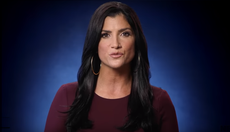 Let’s think for a second about the National Rifle Association’s controversial new video, “The Violence of Lies.” Much has already been said about this one-minute video; critics say it advocates violence and racism, and defenders deny this and say “clenched fist of truth” is only a metaphor. So let’s break it down. It’s going to get a bit nerdy but bear with me; this video is a revealing piece of rhetoric and it’s worth taking a moment to understand what it’s saying and how. By David Barr
When I prepared to leave the confines of rural, evangelical middle America for the imposing halls of secular, University-of-Chicago middle America, many of my Christian friends expressed grave concerns about the dangerous ideologies I would encounter there. They mentioned atheism, of course, but their main concerns were post-modernism and moral relativism. I was warned I would encounter people who didn’t believe in objective truth, who thought everything was subjective. Now, I did run into a lot of that stuff, especially among students with unruly hair, who smoked cigarettes, used “construct” as a noun, and said things like “Foucault.” Even students with normal hair often told me that what I believed was fine, but that there was no way to really know what was true when it came to things like religion and morality.  By Russell Johnson I once read about a woman who tried to send an email to an accounting firm that said, “I am afraid that we will have to postpone our meeting.” But she hit ‘send’ prematurely, and all the email said was: “Hi Jeffrey, I am afraid” This sort of thing happens to all of us. This week, it happened to President Trump. Shortly after midnight, Trump tweeted, “Despite the constant negative press covfefe”. Everyone immediately recognized that he was trying to type “coverage” and slipped up. He made a typo on social media and hit send before fixing it, which again is not a big deal, even for a sitting president. People had a lot of fun with “covfefe,” but it is a human mistake, maybe even an endearing mistake, for the President to make. But then…  By Russell Johnson Leading up to Lady Gaga’s Super Bowl performance, countless bloggers wondered about whether or not she would “go political,” and whether or not she should. After her performance, many debated whether or not it was “political,” including one memorable op-ed that argued precisely by being apolitical she made the perfect political statement. Classic Gaga. We’ve all heard people get frustrated when a TV show gets political or a company makes a political statement or a Facebook friend makes too many political posts. The general sense is that in these contexts one should stay non-political and if one does address politics, one should do so in a non-partisan way (e.g. saying “make your voice heard, get out and vote” is fine, but telling people how they should vote isn't). |
Archives
September 2020
Categories
All
|


 RSS Feed
RSS Feed